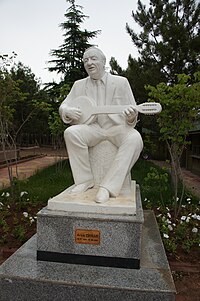Aram Tigran

Aram Tigran (Armenian: Արամ Տիգրան) or Aramê Dîkran (Kurdish rendering from Western Armenian), born Aram Melikyan (Armenian: Արամ Մէլիքեան), (1934 – 8 August 2009)[1] was a contemporary Armenian singer who sang primarily in Kurdish. Among Assyrians in Qamishli he was known as Aram Dikran.
Tigran was born in Qamishli in northeastern Syria to a family originally from Diyarbakır, Turkey.[2] His first Oud he received from his uncle at the age of six.[3] After finishing ninth grade, he concentrated his efforts on learning music and playing Oud[2] and in 1953 he gave his first public concert at the Newroz celebrations.[3] By the age of twenty years, he was singing in four languages: Kurdish, Arabic, Syriac and Armenian.[2] In 1966 he moved to Yerevan, Armenia, at the time a part of the Soviet Union, where he worked for 18 years at the Radio Yerevan.[3][4] He left Armenia in 1995 and settled in Athens.[3] He is considered among the best of contemporary Kurdish singers and musicians.[5] He recorded 230 songs in Kurdish, 150 in Arabic, 10 in Syriac, 8 in Greek.[6]
Tigran died in Athens on August 8, 2009, in the Evangelismos General Hospital.[7] Tigran wanted to be buried in Diyarbakır in Turkey,[8] but the Turkish authorities refused this request.[4][9] He was buried in Brussels instead.[10]
He was married and had three children.[10]
Albums[]
- Çîyayê Gebarê, Aydın Müzik, 2004.
- Zîlan, Aydın Müzik, 2004.
- Serxwebûn Xweş E, Aydın Müzik, 2004.
- Kurdistan, Aydın Müzik, 2004
- Xazî Dîsa Zarbûma
- Rabin
- Evîna Feqiyê Teyran
- Keçê Dinê
- Ey Welato Em Heliyan
- Ay dilberê
- Daye min berde
- Diyarbekira serin
- Aydil
- Em hatin
- Heval Ferat
Notes[]
- ^ http://www.bianet.org/english/minorities/116375-armenian-kurdish-musician-aram-tigran-to-be-buried-in-diyarbakir
- ^ Jump up to: a b c Interview with Aram Tigran Archived June 13, 2008, at the Wayback Machine, (in Kurdish).
- ^ Jump up to: a b c d "The bard of the Middle East: Aram Tigran". ANF News. Retrieved 2019-04-09.
- ^ Jump up to: a b Marchand, Laure; Perrier, Guillaume (2015-04-01). Turkey and the Armenian Ghost: On the Trail of the Genocide. McGill-Queen's Press - MQUP. p. 180. ISBN 9780773597204.
- ^ Kutay Kugay,The way of Kurdish Music, Sing Out!, Summer 2007.
- ^ http://www.mmo.org.tr/resimler/ekler/d7970532bfa1449_ek.pdf?dergi=413 page:2
- ^ "Armenian and Kurdish Musician Aram Tigran Dies". IANYAN Magazine. Retrieved 2019-07-31.
- ^ Armenian and Kurdish Musician Aram Tigran Dies, by Liana Aghajanian, Aug. 2009
- ^ Aram Tigran'ın vasiyeti gerçekleşmeyecek, by Hilal Koylu / Umay Aktas Salman, Aug. 2009
- ^ Jump up to: a b "The bard of the Middle East: Aram Tigran". ANF News. Retrieved 2019-07-31.
- Armenian male singers
- Syrian people of Armenian descent
- 1934 births
- 2009 deaths
- 20th-century Armenian singers
- 20th-century male singers
- Kurdish-language singers
- People from Qamishli